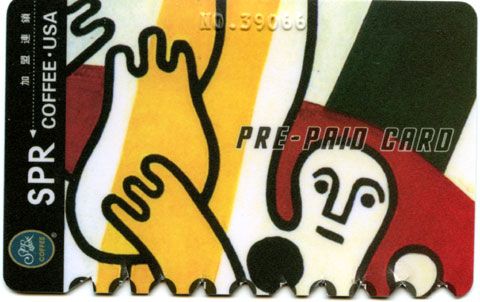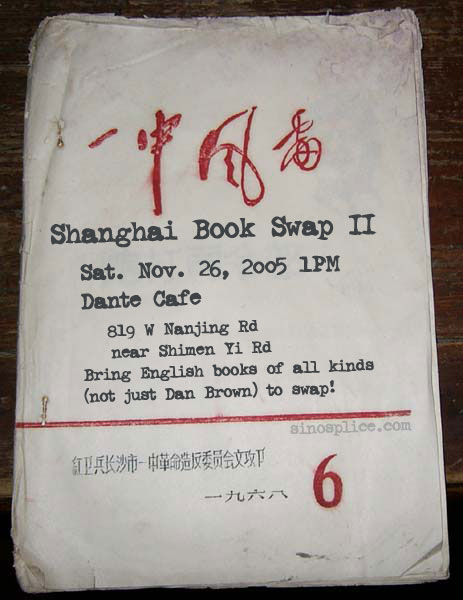25
Nov 2005学习中文的五个阶段
几年前我用英文写了一篇《The Five Stages to Learning Chinese》,为对外汉语做了我自己小小的贡献。好像有不少学习中文的外国人觉得我写的有道理。其中有Alex—一个住在台湾的澳大利亚籍朋友。他把我的文章翻译成中文,也加了一点台湾的味道。如果你有兴趣,请看看中文版:《学习中文的五个阶段》。
25
Nov 2005A Look at Traffic
Traffic can be pretty crazy here. I think it’s not as bad in Shanghai as in other parts of China. Some countries’ streets seem even more frantic, however. And yet, amidst all the chaos, traffic still flows…
Traffic in Saigon:
23
Nov 2005Shanghai Book Swap #2
The first one was a success, so here we go again. The second Shanghai Book Swap happens this Saturday. Be there!
I have to admit, I haven’t had time to read the handful of books I got at the first book swap. I’ve got my hands full with work and school, so occasionally taking in pieces of Asimov’s Foundation series is about all the non-school-related reading I’ve been doing lately, aside from browsing God’s Debris. But it is the will of the People that the next swap be this month. So be it. I’ll be there, feverishly swapping books I haven’t even read yet…
22
Nov 2005Thanksgiving Dinner in Shanghai
It has always been my policy in China that if I can’t be with my family for Thanksgiving, I should at least try to get in some good Thanksgiving eating. Last year I had my Thanksgiving dinner with Brad at a Sofitel Hotel in Pudong. At around 200 rmb, it was pretty expensive, and not fantastic. This year I made some more phone calls to find out which American hotel chains in Shanghai were having Thanksgiving dinners. Most of the calls went something like this (in English):
> Staff: Hello, [hotel name].
> Me: Hi, is your hotel having a Thanksgiving dinner this Thursday?
> Staff: Let me transfer you to the restaurant.
> Me: OK.
> Staff: The Chinese restaurant or the Western restaurant?
> Me: Uhhh… Western.
> Restaurant Staff: Hello, [hotel restaurant name].
> Me: Hi, is your restuarant having a Thanksgiving dinner this Thursday?
> Restaurant Staff: Yes, we have a buffet dinner.
> Me: A Thanksgiving buffet dinner?
> Restaurant Staff: Thanksgiving?
> Me: Yes, Thanksgiving. 感恩节.
> Restaurant Staff: 感恩节? Oh, no. It’s Italian food.
> Me: OK, thank you.
I don’t think that the Chinese should all recognize and celebrate Thanksgiving or anything ridiculous like that. I just expected most of the nicer international hotels in Shanghai to offer some kind of Thanksgiving meal. I guess that’s just not always done.
After about 5 or 6 unsuccessful hotel calls, I did what I should have done in the first place. I Googled Shanghai Thanksgiving dinner. I found the following pages helpful:
1. SmartShanghai Dining Specials (this page is continually updated, so it features Thanksgiving specials only this week)
2. ShanghaiExpat: Thanksgiving Dinner (more expensive options)
I found two deals at reasonable prices: the Holiday Inn Vista Shanghai Thanksgiving Dinner for 149 rmb per person (I had called the Pudong Holiday Inn, and they were oblivious to Thanksgiving over there), and the Moon River Diner Thanksgiving for 150 rmb per person.
I chose the Moon River Diner dinner (the menu looks awesome!), but the Gubei restaurant’s Thursday night was already full, so I had to make a reservation at the Pudong location. I actually talked to the chef on the phone! He’s a guy named Micahel from New Mexico, and he assured me it would be authentic. As he pointed out, the few hotels putting on the super expensive Thanksgiving banquets hire European gourmet chefs, so they present distorted fancy-pants interpretations of Thanksgiving dinner. Totally not like mom used to.
So I’m looking forward to this dinner. If you’re in Shanghai and you want to seize your once-a-year chance for a Thanksgiving dinner, you better hurry up and make a reservation.
21
Nov 2005Chinese Breakup
This is another Chinese “love story,” but without a happy ending this time. It’s called “My girlfriend got pregnant, but she won’t marry me.”
> We had been together for eight full months, and our relationship was going great. But last month I wasn’t careful enough, and my girlfriend got pregnant. I felt truly sorry about that — we weren’t married, after all. When I found out she was pregant, I took a week off work to be with her. Then I saw her back to her hometown so she could spend some time there. But after a month she returned to work and refused to acknowledge me. Maybe it was her parents’ counseling, or perhaps something else? I kept asking her, so today she sent me a text message:
>> The three reasons she wants to break up with me:
>> 1. The problem is that I’m from out of town. Our families are 240 km apart, and her family doesn’t want her to marry someone so far away.
>> 2. It was a mistake that she accepted me. (Loving each other doesn’t count for anything?)
>> 3. It was a mistake that she viewed the issues too simplistically! (Actually, when we first started dating, we thought about the issues: (1) we would live where our careers take us, and (2) whether we could afford to buy a house.)
>> There’s nothing I can say — but I really love her!
Two things that struck me as very Chinese:
– That a distance of 240 km (150 miles) between the couple’s families could be considered an obstacle.
– That the breakup was done by SMS (text messaging)! I’ve noticed that Westerners generally try to do breakups in person. The new generation of Chinese, however, seems to think there’s nothing wrong with breaking up over the phone, by SMS, or even on IM!
Translator’s Note: I know my translation is a little weak in parts. I welcome suggestions for revision!
20
Nov 2005On writing about China
TalkTalkChina recently had a post about sinologists. I found bigdog’s comment especially amusing:
> A prof I had at B-school once described it like this (or something like this):
> In China for a week, you can write an essay on it.
> In China for a month, you can write a paragraph on it.
> In China for a year, you can write a sentence on it.
> In China for longer, nothing you can say.
This totally makes sense, and I’d like to agree… but then, what am I doing???
19
Nov 2005Ah, ah, ah! Hey, hey, hey!
I went to a punk show at Live Bar on Thursday. I especially wanted to see the Japanese bands. (Japanese bands usually know their punk… moreso than me.) Some observations:
– There were five bands: three Chinese, two Japanese. One of the Chinese and one of the Japanese bands were all-girl bands. Another Chinese band was composed of three guys with a female vocalist. Girl punk invasion!
– The Chinese bands, when setting up, usually test the mic by saying “喂?” (“Hello?”) and “听得见吗?” (“can you hear me?”). Both Japanese bands said “ア, ア, ア! ヘ, ヘ, ヘ!” (“Ah, ah, ah! Hey, hey, hey!”) over and over. It sounds pretty funny.
– The music was all right.
– I wondered about the practicality of a Japanese band coming to China on tour, and a tiny little local bar like Live Bar at that. I asked one of the mohawked Japanese guys how it worked. He said they have to pay for their plane tickets, but the rest of the touring costs are covered.
– I confirmed that after five years in China I can still speak Japanese, but I am starting to suck at it. Yikes. I have to do something about that, or my major is going to become completely meaningless (and it wasn’t worth a whole lot to begin with!).
Two photos from the event, via Shanghai Streets (click photos for more):
17
Nov 2005Unsolved Mystery
It’s pretty well-known that Chinese college boys love computer games. When I taught in Hangzhou, I saw firsthand how those guys would spend every free minute in internet cafes playing CounterStrike or whatever the latest network game was. The reason for the obsession was hard for me to grasp.
Then I saw two eye-catching entries on Bingfeng’s Teahouse which offered a possible explanation:
Bingfeng’s large collection of “Chinese Internet Girl” photos (click on both photos above for more) — evidence of the proliferation of digital cameras, webcams, and internet usage in China — offers a compelling possible explanation for Chinese boys’ infatuation with the internet.
The thing is, I still think the vast majority of them just really like those damn games.
16
Nov 2005CBL: Bingfeng and RSS
Bingfeng of Bingfeng’s Teahouse did this week’s Top Ten List for the China Blog List. I think it’s kinda interesting to see which blogs about China–by foreigners–a Chinese guy reads. There you have it.
In other news, for the blogs that provided the URL, I have added RSS links to the lower right corner of the entries in the list… sort of. I can say for sure that it works in Firefox, but there’s an occasional 1-pixel lower gap. (Firefox, what part of bottom: 0; don’t you understand??)
The interesting (or maybe “interesting”) thing is that while the CSS doesn’t work in IE, it has absolutely no ill effects… the links are just totally not there. I have no idea why, or where they went. As is often the case with IE’s rendering, it’s a mystery. If anyone can take a look at the CSS and clear it up for me, I’d appreciate it.
15
Nov 2005Shanghainese Study Materials
I was recently asked to help someone find some study materials (books, tapes, CDs, etc.) for Shanghainese. Clearly, Shanghai is a good place to look, but I soon discovered that finding good materials was not as simple as going to a big bookstore in Shanghai. To assemble a rather complete collection of materials I had to visit seven bookstores in Shanghai. What is strange is that almost every bookstore had one or two books on Shanghainese, but almost every store’s books were different! For that reason I can’t be sure that there aren’t still some good ones out there, but I think I got most of them.
This will probably only be helpful to students of Shanghainese in Shanghai, but the following is a list of materials I found. I have not used these materials, nor am I fluent in Shanghainese (although I do understand quite a bit), but I think I understand a thing or two about what makes a good language textbook, so I have made a few key observations about each book. Note that the three books which I deemed the best got their own reviews elsewhere on Sinosplice. (Chinese Textbook Reviews now has a small section on Shanghainese.)
14
Nov 2005SPR Coffee
I spend an hour or two in a local coffee shop from time to time. The name of the place is “SPR Coffee.” I was a bit curious as to where the name came from, but I didn’t have to look far to find the answer. A sign told me “SPR comes from SPRING.” Yes, that’s right. They took the first three letters of the word Spring for their name. Bizarre.
Once again, Asians show us that they may be learning English, but they don’t have to totally play by our rules.
The store also has an interesting discount system for regulars. You can buy a 200 rmb pre-paid “coffee card.” It looks a lot like a credit card. I thought I knew this system. It would have a magnetic strip and a declining balance, and it would give me a discount. Nope. Wrong.
There is no magnetic strip. The numbers 1-10 are printed at the bottom of the card. Every time I use the card to buy a large coffee, the card is notched appropriately with scissors. Simple, but effective.

P.S. I’m always a little bit afraid to write about something like this, because for all I know this system is used all across the USA these days. I wouldn’t know.
14
Nov 2005Shanghai Dialect for Foreigners
Edited by 徐子亮 (Shanghai Haiwen Audio-Video Publishers, 2005)
Review by: John Pasden
14
Nov 2005A Chinese two-channel contrastive textbook of Mandarin and Shanghai dialect
Edited by 陈阿宝 (海南出版社, 2005)
Review by: John Pasden
13
Nov 2005Y.I.Y.O.
Wow.
I thought I’d heard some pretty cheesey Chinese pop, but I think this song by “Y.I.Y.O.” tops them all. It’s called 《嫁给我好吗?》 (“Marry me, OK?”). As if the singers themselves looking as cheesey and lame as possible wasn’t enough, they took their nauseatingly saccharine lyrics and merged them with 50’s-style doo-wop! The result is mind-blowingly horrible. At the risk of my own sanity, I did some checking up and discovered that the group only seems to have made one song in this craptacularly awful style. Check it out:
Y.I.Y.O. – 嫁给我好吗?(Flash)
[lyrics link]
I have a morbid fascination with horrible music. Sorry for bringing you all down with me.
12
Nov 2005All Apologies
A Chinese story:
> At 8:40am I called her on her cell phone. “Are you headed off to work?” I asked.
> “Sure am!” she laughed back.
> Choking back a sob, I said to her, “Wen… I’m sorry.”
> After a moment of stunned silence, she replied, “why are you apologizing to me?”
> “It’s nothing,” I explained.
> “Xiao Nuo, you…” she started, but I quickly hung up.
> At ten minutes past noon I dialed her office number.
> “Why isn’t your cell phone on?” she demanded emotionally.
> Stammering, I finally got out, “I’m sorry…”
> She asked me, “why did you send me a check at work?”
> “Wen, I really love you,” I replied.
> Her voice suddenly rose in volume. “If you want to break up with me, just say it. Don’t give me some kind of breakup money!”
> After a few seconds of silence, I hung up.
> At exactly three in the afternoon, she answered the phone coldly. “Your feelings have changed?”
> I changed the topic. “I’m here with your parents.”
> She cried in surprise, “why are you meeting with my parents?”
> I simply replied, “I just feel I need to apologize to them.”
> She took a deep breath, trying hard to suppress her emotions. “Just what is our relationship to you?”
> I slowly replied, “I’m sorry. I hope you can forgive me…”
> On the other end she was all choked up. This time she hung up on me.
> At 8:40 in the evening my cell phone vibrated. I pressed the receive button, saying, “you’re home!”
> She asked, “Where are my mom and dad?”
> I answered guiltily, “Wen, I’m sorry!”
> She roared back, “I don’t want to hear ‘I’m sorry!’ I just want to know why!”
> Feigning calmness, I said to her, “I apologized to your parents because you’re their dearest baby girl, and I asked them to allow you to marry me. I apologized to you because I know I can’t be without you, but I’ve never been good at looking after people, so I hope that in the days to come you’ll be with me, looking after me. I’ve given you all the money I have left. I’m making the down payment on our new home, and your parents are helping us pick out the furniture. Wen, I’m sorry. Please marry me!”
> To my amazement, her attitude immediately softened completely. “Xiao Nuo, where are you?”
> Full of joy, I answered, “I’m right outside your door.”
> I later married Wen…
> But that day I proposed, I verified one other thing: it really does hurt to be whacked upside the head with a broom.
This story was originally posted in Chinese. Yes, it’s a cute story, but I have to say… not only does it strike me as a very un-Chinese way to propose, but it seems downright cruel! What guy could do that to his girlfriend?
I let my girlfriend read the story. There’s no way she would put up with that crap. No question. I wonder how many Chinese girls would think it’s romantic. I don’t think any American girl could.
09
Nov 2005A Look at Chinese Bloggers
Micah recently did a summary of the Chinese Blogger Conference. Then he updated it with a link to Rebecca MacKinnon’s thoughts on the matter. Wow. I thoroughly enjoyed her post, and was glad to be able to read a condensed list of key ideas. I recommend you read her whole article (blocked in China), but here are some key quotes to represent what I considered the most interesting ideas:
- Web2.0 is potentially a very Chinese thing.
One of the most important words in the Chinese language is “guanxi.” It means “relationship.” Whatever you think about the term “Web2.0”, the point is that social networking and relationship-building are at the core of today’s most exciting web innovations. The Chinese happen to be the most natural and skilled social networkers on earth.
- Individual empowerment with Chinese characteristics.
A key theme of the whole conference was how the semantic web empowers and amplifies individual voices. On Sunday afternoon, Blogger “zuola” described how his blog is his personal platform for his own ideas. Blogging, he believes, helps us understand our lives better. Chen Xuer, one of the bloggers who volunteered to work on the conference, said he started blogging and reading blogs because he wanted “to hear the truth and speak the truth.” Sound familiar?
- Web 2.0, just like Web 1.0, is not going to spark a democratic revolution in Chinese politics any time soon.
People here find it annoying that the Western media keeps framing the Chinese internet story within the question of whether the internet will or won’t bring down the communist party. The real story is about the cultural and social implications of the semantic web as it continues to spread among China’s fast-growing pool of internet users. In the very long run, cultural and social change may have political implications, but to people here any attempt to speculate on that is counter-productive.
Just read the whole thing. I can’t quote it all.
P.S. If you don’t know what Web 2.0 is… well, sorry. You’re just not geeky enough.
08
Nov 2005Shanghai Bloggercon Revealed!
Just in case your inner geek is the least bit curious about what went down at the Chinese Blogger Conference in Shanghai over the weekend, Micah offers a fairly extensive account.
So yes, I was curious how it went. Did I read Micah’s whole account? Yes. Do I wish I had gone? No. (I had to beat Shadow of the Colossus over the weekend! Man, that is a truly awesome, ground-breaking game.)
I think we can expect another account of the Bloggercon from a different angle out of Chinawhite very soon.
This is a pretty crazy week for me; I may take a short break from blogging. After that, I’ll be tackling some subjects/projects on Sinosplice that I’ve been postponing for a while…
07
Nov 2005Things I learned last Friday
Last Friday night my friend DJ Carl was spinning so I went to check his set out at La Fabrique with my girlfriend. While there a kind soul gave us tickets to see Scott Bond at DKD so we did that too. I learned a few things:
1. A girl can look pretty hot with her hair up and chopsticks in her hair.
2. The chopsticks in her hair are not actually to be called “chopsticks.” That would be silly. They are actually “hair accessories.”
3. Girls with chopsticks in their hair do not belong on the dance floor. Someone could lose an eye.
4. I’m getting old. Even despite Carl’s numinous performance the club thing holds little appeal for me anymore. (I’m not sure it ever did, but I used to be able to fake it, at least.)
06
Nov 2005Two Ways to Trust
My friend Wayne likes to come up with interesting questions and then pose them to his friends. His latest question was, “How do you make someone trust you?”
He posed this question to a male Chinese friend. That friend’s answer was:
> There are two ways:
> 1. You can tell that person all your secrets.
> 2. You can give that person all your money.
Hmmm…
One of Wayne’s past questions can be found in the entry Versions of Truth.








